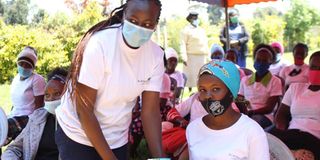For reproductive health, let’s talk about it

Girls receive gift hampers after a reproductive health seminar in Murang'a County.
What you need to know:
- Kenya was the first to abolish ‘tampon tax’, in 2004.
- It abolished import duty on sanitary products in 2011.
- Let the government support community elders who run initiation ceremonies.
In response to Abigail Arunga’s article, “The many ways Kenya proves it hates women” (DN, August 25), I believe most of Kenya’s problems are due to incompetence and corruption. There are laws, and policies to tackle the challenges girls and women face are simply not implemented.
The Sexual Offences Act was passed in 2006 while the Election Offences Act 2016 recognises that sexual and gender-based violence (SGBV) is a persistent problem during elections.
One challenge in the entire legal system is that evidence goes missing. The Independent Policing Oversight Authority (Ipoa) says the police cannot gather sufficient evidence to charge a suspect in two out of three felony cases. The police and Judiciary are under-resourced and often under-trained for such matters. An example is the lack of children’s courts in most parts of the country despite this being stipulated in the Children Act.
Kenya was the first to abolish ‘tampon tax’, in 2004. It abolished import duty on sanitary products in 2011. The government launched the Sanitary Towels Programme in 2011 to provide girls with menstrual health products and the Basic Education (Amendment) Act 2016 gave them free sanitary pads.
All these measures are aimed at ending period poverty. However, that goal is yet to be met.
When I was a student in a public secondary school in Nairobi in 2015-2018, we received two packets of pads only once, in 2018. This is common across the country. Officials have been caught selling the pads and the money for the programmes stolen.
Finally, it is alleged that children do not receive comprehensive sex education — yet it is incorporated in the curriculum at the primary and secondary levels. This includes reproduction. Taught in science and biology classes, it covers menstruation, copulation and pregnancy. Similar topics covered in religious education include contraception, healthy sexual relationships and sexual abuse such as rape. The topics are also covered in other subjects, such as literature.
However, a study showed a gap in perception — 75 per cent of teachers reported teaching the content but only two per cent of students claimed to have received the information. This may be due to shortage of textbooks, lack of training or absenteeism by teachers and students.
Let the government support community elders who run initiation ceremonies. Traditionally, sex was a taboo topic, but was discussed freely in such forums. Young people went through initiation at the onset of adolescence, a prime age to discuss sexuality.
John Dewey said “a problem well put is half-solved”. To tackle the issue effectively, we must first identify the problems correctly.
Angela Langat, Kericho




